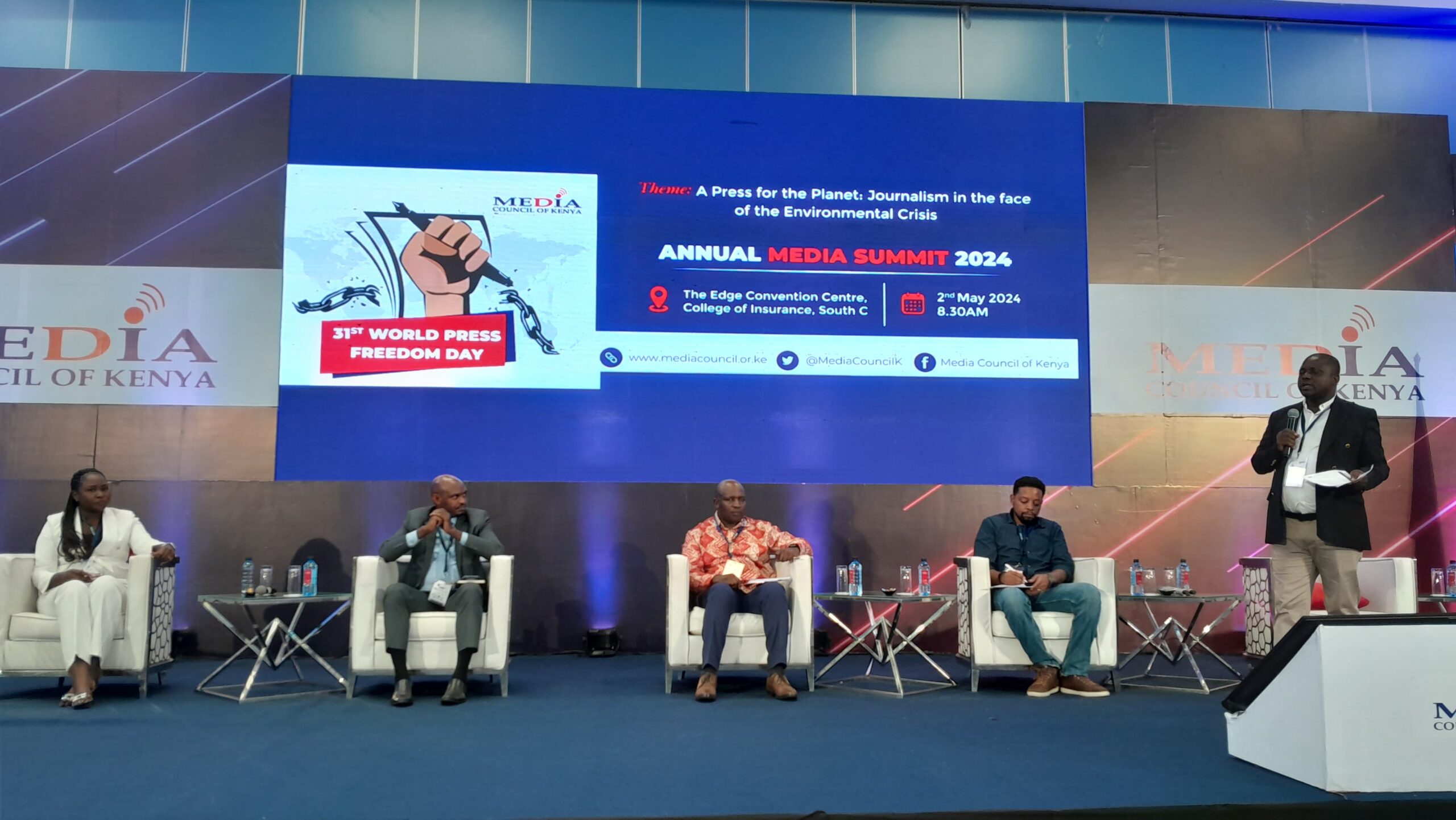By Wesley Langat And Sandra Ndonye
Nairobi, Kenya:Climate change events are happening faster than our ability to respond, thus straining adaptation and mitigation efforts. To effectively combat climate change, it is imperative to have free media to facilitate the sharing and dissemination of climate change information. The theme of this year’s World Press Freedom Day 2024, “A Press for the Planet: Journalism in the Face of the Environmental Crisis” therefore, was apt.
A special media summit held in Nairobi to mark this year’s World Press Freedom Day was organized by the Media Council of Kenya and UNESCO. It placed emphasis on access to information and the role of independent media in reporting climate change-related challenges. Journalists, however, face many obstacles when trying to gather such key information from various state agencies and government departments.
*Mr. Fredrick John, not his real name, is a freelance journalist based in Nairobi. He feels frustrated by government officials, particularly those in communication departments.
“You ask them for an interview, and they request a physical letter to be delivered to their registry,” he states. He often experiences delays or no response at all when trying to secure interviews from key government officials and experts for his climate change stories.
For instance, Fredrick was denied access to the 2023 African Climate Summit in Nairobi, even after verifying his identity. The reason given was that his name was not on the list, despite having registered on time. “I had a tight deadline to meet; my editor was expecting the story by the end of the day, and because of this, I was completely thrown off,” he recounts.
Mr. Francis Mureithi, the Digital Editor at Radio Africa Group and executive member of the Kenya Editors Guild, concurs that journalists often face significant delays in obtaining information from the government. This is mostly characterized by excessive bureaucracy. In some instances, he acknowledges, the government does act more promptly and efficiently.

“Of course, there are also situations where the information is not forthcoming, and this often leads to incomplete stories. Any story should ideally be both representative and accurate,” he remarks.
During the media summit’s discussions, Francis, who was also one of the panelists, emphasized the significance of speed for effective climate change storytelling. He went on to further elaborate on the consequences of information delays, providing examples of scenarios in which journalists require an immediate response from a government official, but that official also requires approvals and clearance from the Cabinet or Permanent Secretary in charge of the docket.
“So what that means is that the stories do not have authoritative voices. This affects the quality, and contributes to misinformation and sometimes disinformation.” Said Mureithi.
Freedom of the press is essential for reporting on climate change.
Hon. John Kiarie MP, Chairman Parliamentary Committee on Communication, Information and Innovation, in his keynote address, lauded this year’s World Press Freedom Day theme, “A Press for the Planet: Journalism in the Face of the Environmental Crisis,” as timely; as the country currently faces the climate change challenges. He reiterated that the freedom of the press is crucial in enabling the media to successfully fulfill their role in disseminating climate change information and enhancing the understanding of the general public.
Mr. Kiarie underscored the need for collaborative efforts across various sectors to enable journalists to collect data and process and disseminate information to the public effectively.
“Professional journalism cannot operate independently. It is also essential to humanize journalism to ensure a press for the planet, especially when reporting on environmental crises,” He added.
Ms. Ito Misako, UNESCO’s Regional Advisor for Communication and Information in Africa, expressed her opinion on the focus of this year’s World Press Freedom Day. She emphasized the significance of journalism in addressing the climate crisis, stating that advocating for free and diverse media not only benefits society, but also contributes to the preservation of our planet and environment. She highlighted the importance of access to reliable information, scientific facts, and data, in order to safeguard our environment and planet.
Furthermore, Ms. Ito Misako highlighted UNESCO’s commitment to promoting press freedom, freedom of expression, and media development. The organization, therefore, prioritizes the safety and crucial role of journalists in reporting on climate change and the environment.
“Among the issues we are working on is the safety of journalists covering climate change. Our attention has been drawn to various studies revealing that journalists covering environmental issues are particularly vulnerable to attacks,” she noted.
Ms. Misako added that UNESCO is also building journalists’ capacity in reporting on climate change to enable them to understand, analyze, and extract simple messages from very complex scientific data, as well as tackle climate-related misinformation and disinformation, particularly online.
“We have seen that a lot of reports show that climate-related disinformation is proliferating online, which undermines the global actions against climate change,” says Ms. Ito.
The Media Council of Kenya’s Mr. Victor Bwire, director of Media Training and Development, agrees that the free flow of information, particularly in this era of the environmental and climate crisis is key.
A comprehensive needs assessment was conducted to identify the gaps in environment and climate change reporting in Kenya, Uganda, and Ethiopia. The assessment revealed that the primary factor contributing to fewer environmental stories is the lack of access to information.
“We want to focus on building the skills of senior public officers on how to share information, including on the environment,” he says.
As part of creating a conducive reporting environment for faster sharing of information on climate change, the Council is currently conducting field-based training sessions for communication officers from different government agencies to enhance their communication skills and media relations in order to more effectively interact and disseminate information to journalists.














